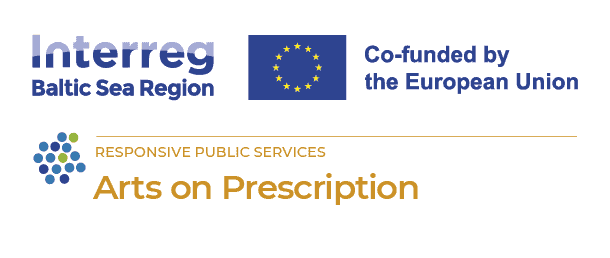
Lessons learned from Funen Culture on Prescription, Denmark
18 September 2023
In 2022, four municipalities in the Region of Funen (Denmark) – Kerteminde, Odense, Ærø, Fåborg-Midtfyn – have developed and tested Funen Culture on Prescription for adults aged 31-65 who are dealing with mild to moderate stress, anxiety, depression or are feeling lonely. With the goal to improve their mental and social well-being and quality of life, 10 participants met voluntarily 2 hours 2 times a week over a period of 8 weeks and took part in different cultural activities – organised, facilitated and evaluated by the “Arts on Prescription” associated project partner ‘Culture Region Funen’.
A short film gives valuable insights into activities and experiences of participants, coordinators and facilitators of the Funen Culture on Prescription programme that has been evaluated in 2023 by researchers from the Department for the Study of Culture at the University of Southern Denmark. Here we highlight the six most important conclusions and experiences of the evaluation of the first part of the programme.
For more information on evaluation results and future model programmes in the region, please contact the programme manager: Mathilde Kihl Kellermann, email: makk@odense.dk, phone: +45 20 25 80 86
#1 Very pleased participants
So simple can the preliminary results be presented, the numbers speak for themselves. Generally, the participants in Arts on Prescription in Funen are pleased with the project, with a total of 81% expressing they are very pleased with Arts on Prescription and 19% expressing they are pleased.
#2 Participants wellbeing improves during the programme
The participants were asked about their wellbeing before and after the programme. Evaluation reveals that 9 out of 10 participants improved their wellbeing during and after the Arts on Prescription programme in Funen. The evaluation also revealed that the participants health improved. These findings also resemble other evaluations from other areas in Denmark.
It was Karen Hvidtfeldt, professor from the Institute of Language, Culture, History and Communication who presented the results and where the participants statements provide the basis for the results.
#3 The Coordinator has an important role
Karen Hvidtfelt also highlighted the importance that the municipality’s coordinator has for the participants in the programme. One of the participants compared the coordinator with the captain of a boat, who provides constant security/safety within the group. The coordinator’s role can both be a huge advantage – but also a vulnerable set-up, if the coordinator is no longer available, or has something else to do/gets a new job.
#4 An important fellowship
Basically, it is fellowship in Arts on Prescription, that is one of the most important elements and is a recurrent factor among many of the participants.
However, it cannot be proven how much immersion in the arts, or the social fellowship, or if it is both that creates the programmes positive effect.
#5 Arts on prescription creates free space for the participants
The participants also highlight that the Arts on Prescription programme has created a free space from illness and negative thoughts and the designated free space has meant a lot for their positive experience of the programme.
Nevertheless, Karen Hvidtfeldt also pointed out the dilemma, if it is even possible to create a diagnosis free space and at the same time would like to measure if the programme works. It is one of the dilemmas she is observing in the next part of the evaluation.
#6 A shewed gender balance
The majority of participants in the project were women, and this was an observation, that was questioned by some of the participants with the question: what would happen with the group dynamic if the gender balance was more equal? Is it because the activities appeal more to women or are there other factors, that play a part? What can be done to attract more men to the programme?
Similar gender representations can be seen from other Arts on Prescription programmes.





